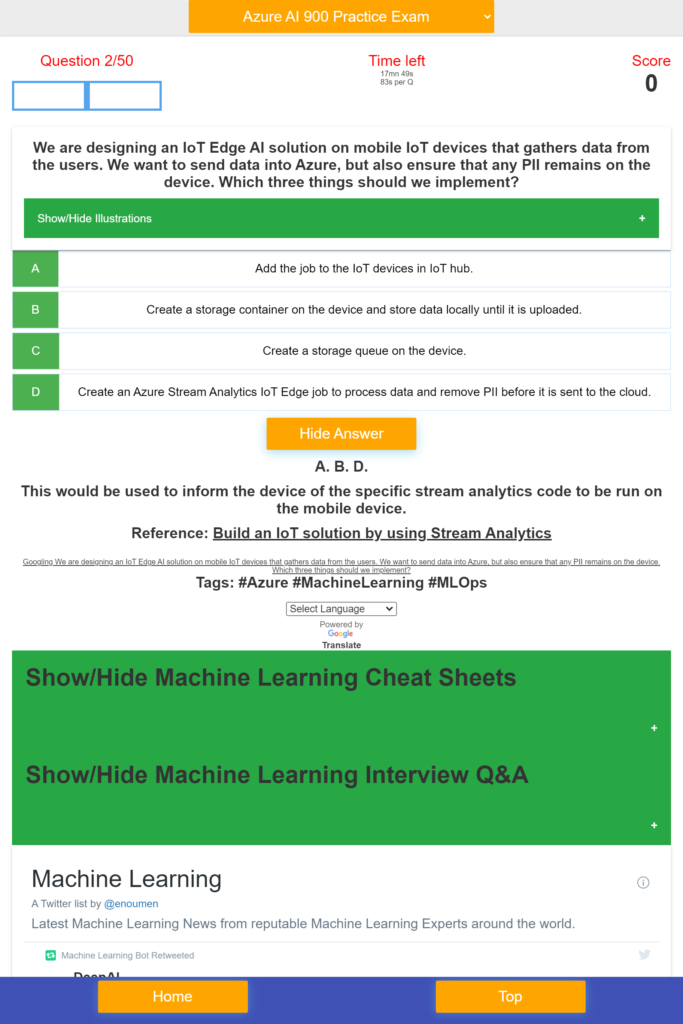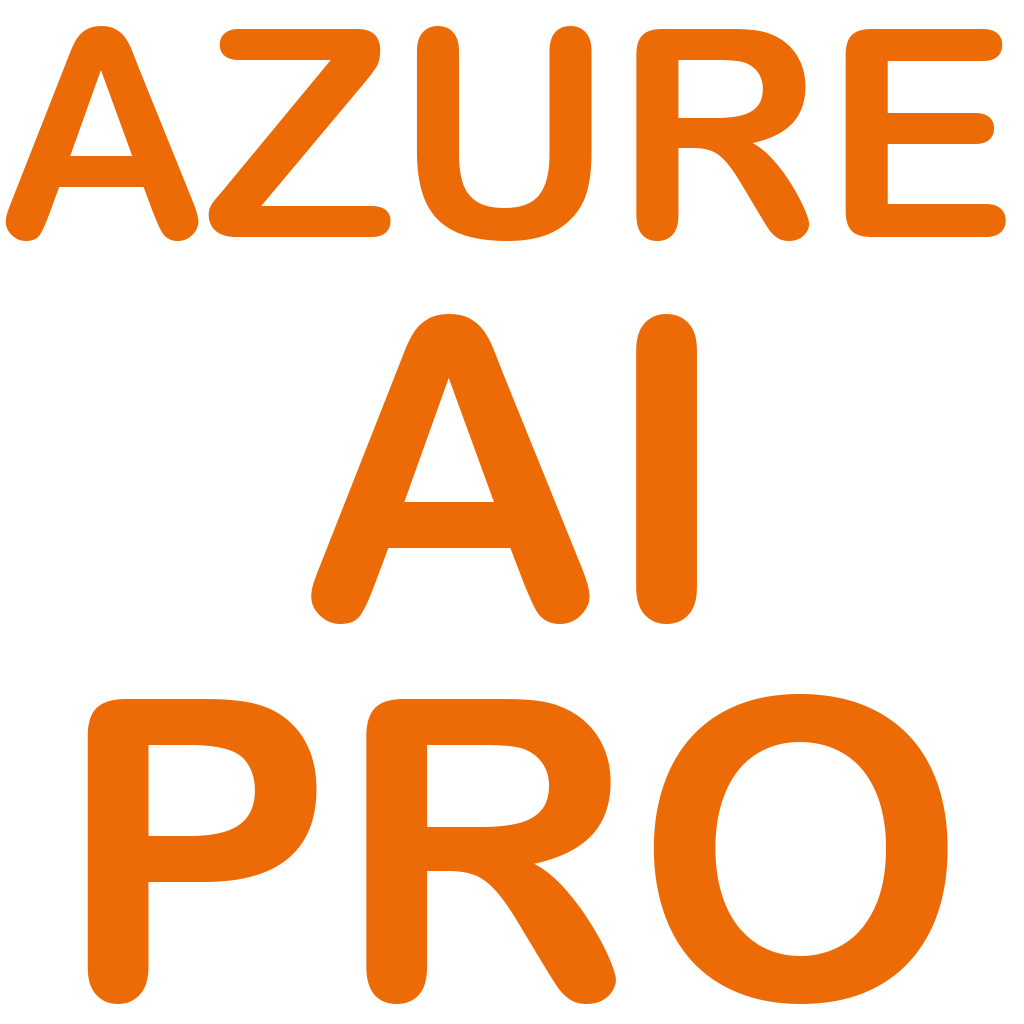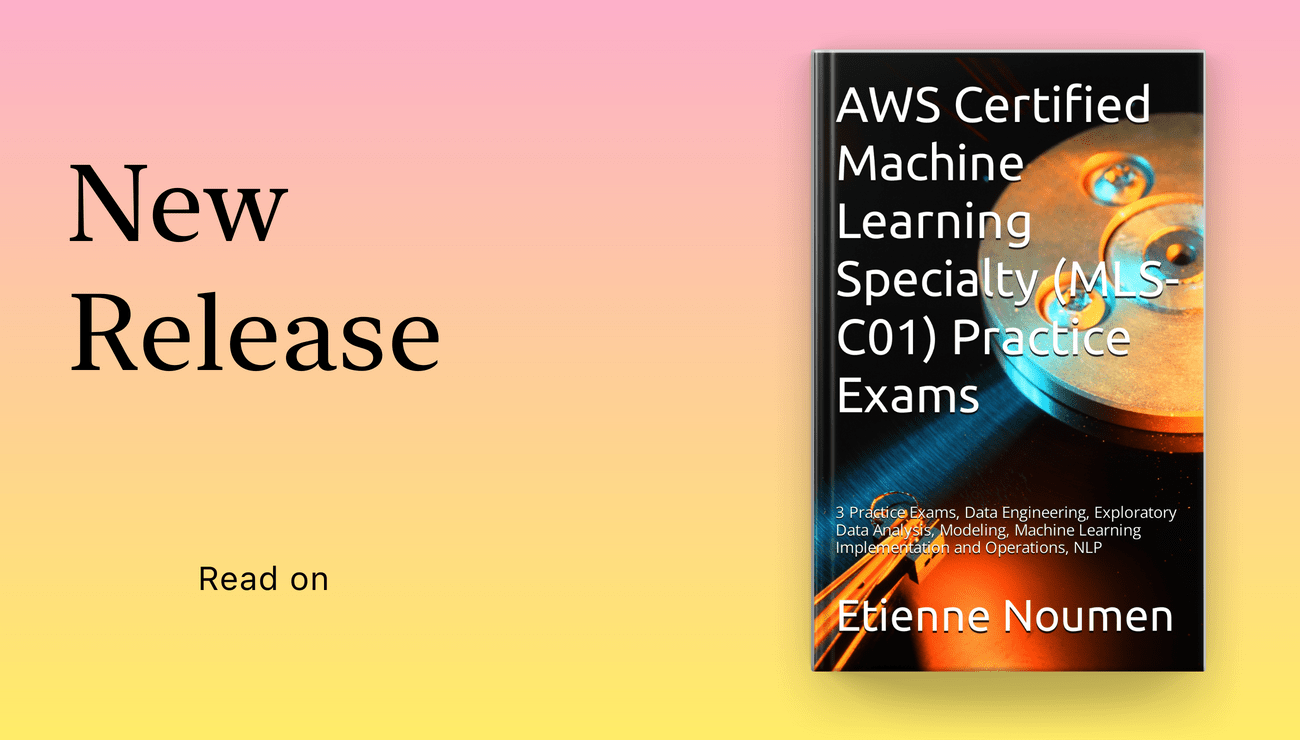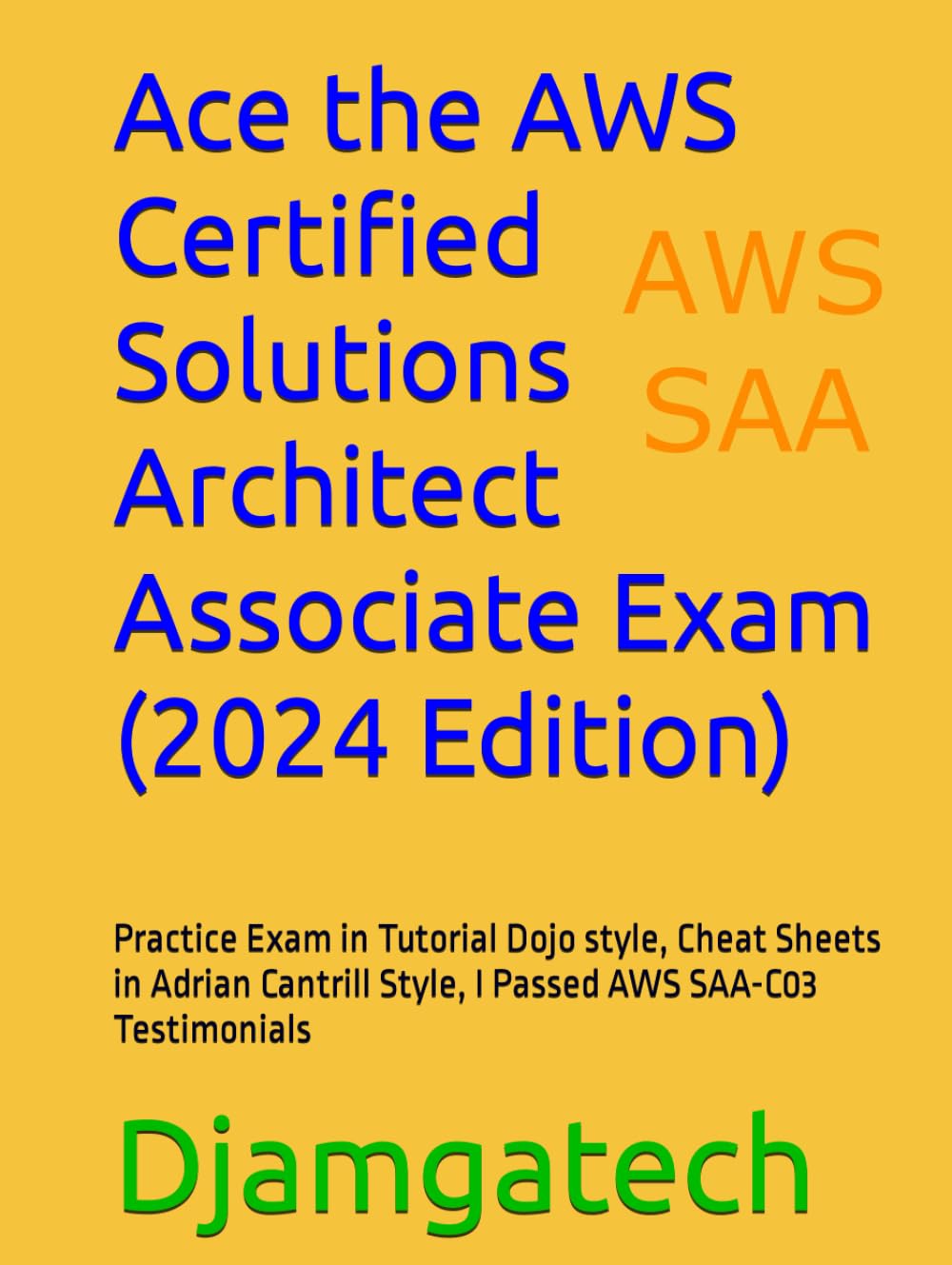You can translate the content of this page by selecting a language in the select box.
Azure AI Fundamentals AI-900 Exam Preparation: Azure AI 900 is an opportunity to demonstrate knowledge of common ML and AI workloads and how to implement them on Azure. This exam is intended for candidates with both technical and non-technical backgrounds. Data science and software engineering experience are not required; however, some general programming knowledge or experience would be beneficial.
Azure AI Fundamentals can be used to prepare for other Azure role-based certifications like Azure Data Scientist Associate or Azure AI Engineer Associate, but it’s not a prerequisite for any of them.
This Azure AI Fundamentals AI-900 Exam Preparation App provides Basics and Advanced Machine Learning Quizzes and Practice Exams on Azure, Azure Machine Learning Job Interviews Questions and Answers, Machine Learning Cheat Sheets.
Download Azure AI 900 on Windows10/11
Azure AI Fundamentals AI-900 Exam Preparation App Features:
– Azure AI-900 Questions and Detailed Answers and References
– Machine Learning Basics Questions and Answers
– Machine Learning Advanced Questions and Answers
– NLP and Computer Vision Questions and Answers
– Scorecard
– Countdown timer
– Machine Learning Cheat Sheets
– Machine Learning Interview Questions and Answers
– Machine Learning Latest News


This Azure AI Fundamentals AI-900 Exam Prep App covers:
- ML implementation and Operations,
- Describe Artificial Intelligence workloads and considerations,
- Describe fundamental principles of machine learning on Azure,
- Describe features of computer vision workloads on Azure,
- Describe features of Natural Language Processing (NLP) workloads on Azure ,
- Describe features of conversational AI workloads on Azure,
- QnA Maker service, Language Understanding service (LUIS), Speech service, Translator Text service, Form Recognizer service, Face service, Custom Vision service, Computer Vision service, facial detection, facial recognition, and facial analysis solutions, optical character recognition solutions, object detection solutions, image classification solutions, azure Machine Learning designer, automated ML UI, conversational AI workloads, anomaly detection workloads, forecasting workloads identify features of anomaly detection work, Kafka, SQl, NoSQL, Python, linear regression, logistic regression, Sampling, dataset, statistical interaction, selection bias, non-Gaussian distribution, bias-variance trade-off, Normal Distribution, correlation and covariance, Point Estimates and Confidence Interval, A/B Testing, p-value, statistical power of sensitivity, over-fitting and under-fitting, regularization, Law of Large Numbers, Confounding Variables, Survivorship Bias, univariate, bivariate and multivariate, Resampling, ROC curve, TF/IDF vectorization, Cluster Sampling, etc.
- This App can help you:
- – Identify features of common AI workloads
- – identify prediction/forecasting workloads
- – identify features of anomaly detection workloads
- – identify computer vision workloads
- – identify natural language processing or knowledge mining workloads
- – identify conversational AI workloads
- – Identify guiding principles for responsible AI
- – describe considerations for fairness in an AI solution
- – describe considerations for reliability and safety in an AI solution
- – describe considerations for privacy and security in an AI solution
- – describe considerations for inclusiveness in an AI solution
- – describe considerations for transparency in an AI solution
- – describe considerations for accountability in an AI solution
- – Identify common types of computer vision solution:
- – Identify Azure tools and services for computer vision tasks
- – identify features and uses for key phrase extraction
- – identify features and uses for entity recognition
- – identify features and uses for sentiment analysis
- – identify features and uses for language modeling
- – identify features and uses for speech recognition and synthesis
- – identify features and uses for translation
- – identify capabilities of the Text Analytics service
- – identify capabilities of the Language Understanding service (LUIS)
- – etc.
Download Azure AI 900 on Windows10/11
Azure AI Fundamentals Breaking News – Azure AI Fundamentals Certifications Testimonials
- How can we efficiently log request payloads and response bodies in Azure API Management without impacting performance?by /u/bravokeyl (Microsoft Azure) on April 26, 2024 at 4:32 am
Stackoverflow link I'm looking to log the entire request payload and response body for APIM requests for auditing and debugging purposes. If we can store to Azure Blob Storage, it would be great! As of now, we have this logic baked into application code(NodeJS App) with a middleware layer to capture request and response and write to a file(using winston logger), then later on, these files are copied to Azure Blob Storage from the VM using Azure CLI with a scheduled cron. I'm looking to see if there is a way to decouple the same from application and handle this at the APIM level. I see a few options: Use Azure Application Insights Use Azure Event Hubs logger Option 1 - Azure Application Insights Using application insights, I see this can be with the following settings, there is a limitation of 8192 bytes though. https://preview.redd.it/5sw05z785rwc1.png?width=1142&format=png&auto=webp&s=1888a14809fb22c24612736a10119b99bf6d0178 With this my worry is that it might affect the performance of the API. Option 2 - Azure Event Hubs logger Using the below policy, and following this guide <policies> <inbound> <base /> <set-header name="xrid" exists-action="override"> <value>@(context.RequestId.ToString())</value> </set-header> <log-to-eventhub logger-id="logger-id"> @{ return context.Request.Body.As<string>(preserveContent: true); } </log-to-eventhub> </inbound> <backend> <base /> </backend> <outbound> <set-header name="xrid" exists-action="override"> <value>@(context.RequestId.ToString())</value> </set-header> <base /> <log-to-eventhub logger-id="logger-id"> @{ return context.Response.Body.As<string>(preserveContent: true); } </log-to-eventhub> </outbound> <on-error> <base /> </on-error> </policies> Event Hubs has a limitation of 200 Kilobytes https://preview.redd.it/btj4d34a5rwc1.png?width=941&format=png&auto=webp&s=3e6077f233af66d471cbc377e0bb8fa5bd645833 submitted by /u/bravokeyl [link] [comments]
- Update method of Azure AVDby /u/Mpacanad1 (Microsoft Azure) on April 26, 2024 at 2:18 am
I like to install updates and a new program and roll them out to AVD in the host pool. Do I simply use one of the session hosts, remove it from the domain, install the updates, and capture the image? Or is there a simpler process? submitted by /u/Mpacanad1 [link] [comments]
- Government issued id for online examby /u/Spirit_Flow (Microsoft Azure) on April 26, 2024 at 1:46 am
Hi, i am going to take the az 900 exam online at home. Does any one in canada know if G1 license is acceptable for the exam? submitted by /u/Spirit_Flow [link] [comments]
- Creating managed vnet to connect ADF to our on-prem sql serverby /u/vinsanity1603 (Microsoft Azure) on April 26, 2024 at 1:15 am
Hi, I'm trying to follow the steps here https://learn.microsoft.com/en-us/azure/data-factory/tutorial-managed-virtual-network-on-premise-sql-server to create a managed vnet to connect ADF to our on-prem sql server for PoC purposes. Does anyone have a simplified version of this tutorial (article or video)? I don't understand one of the pre-requisites: Virtual network to on-premises network. Create a connection between virtual network and on-premises network either using ExpressRoute or VPN. If you prefer to use a cloud virtual machine in a private network, you can do this as well. Just create a virtual network for your cloud virtual machines and a private link to the virtual network and you can access them as if they were on-premises machines in your private network even though they are hosted in the cloud. Also, is two NAT VMs required if I only have 1 on-prem sql server? I wish they just add this to the tutorial, instead of pre-requisite. Can someone please give some advice? Thanks. submitted by /u/vinsanity1603 [link] [comments]
- Free Post Fridays is now live, please follow these rules!by /u/AutoModerator (Microsoft Azure) on April 26, 2024 at 12:01 am
Under no circumstances does this mean you can post hateful, harmful, or distasteful content - most of us are still at work, let's keep it safe enough so none of us get fired. Do not post exam dumps, ads, or paid services. All "free posts" must have some sort of relationship to Azure. Relationship to Azure can be loose; however, it must be clear. It is okay to be meta with the posts and memes are allowed. If you make a meme with a Good Guy Greg hat on it, that's totally fine. This will not be allowed any other day of the week. submitted by /u/AutoModerator [link] [comments]
- Bulk user group updating?by /u/Storxusmc (Microsoft Azure) on April 25, 2024 at 11:40 pm
I was curious if this is possible in azure. I have never used the bulk tool inside of the user profile section, but was curious if you could import list of users already created via this method with any group changes? We already track groups that the users are in an via excel document, so its easier to email. I am curious if I could export all the users as a large excel document, then change which groups they are in to dually use it for importing for changes and tracking via excel. submitted by /u/Storxusmc [link] [comments]
- Dynamic query for Devicesby /u/Ok-Butterscotch-5140 (Microsoft Azure) on April 25, 2024 at 11:13 pm
I want to create device groups in azure using dynamic query. So we are syncing windows devices from on-prem AD, where devices are placed are certain departmental OU. Each department has Prod and Test Workstation OU. I want to create groups for test and prod workstations so I can send updates cycles accordingly. I know we can’t use organizationalunit query while creating device group. Is there an easy way to do it in my case or should I create device groups in on-prem ad and using a script which will run each night and update members and then sync to azure? submitted by /u/Ok-Butterscotch-5140 [link] [comments]
- Azure Web App authentication/authorization using Entra IDby /u/Reddit_Beginer (Microsoft Azure) on April 25, 2024 at 11:12 pm
I created a web page and uploaded it to an Azure Web App (free plan). I want only a specific group of Azure users to view this page. I followed the instructions on this page to configure authentication and added this group to the 'Users and Groups' section of the app (which has the same name as my web app) that was created when I turned on authentication. Quickstart - Add app authentication to a web app - Azure App Service | Microsoft Learn However, when I try to access the web app as a user in the assigned group I added to the registered app(I logged in to myapps.microsoft.com first, then accessed the web app), it says, 'You don't have authorization to view this page.' I didn't add any MSAL code to my page. My question is: Do I need to add authentication/authorization code to my web page, or can I rely entirely on Azure AD for authentication/authorization? submitted by /u/Reddit_Beginer [link] [comments]
- Passed AI-900by /u/Mountain-Nobody-3548 (Microsoft Azure Certifications) on April 25, 2024 at 11:11 pm
Passed AI-900 with a score of 871. By far the easiest exam I've ever taken. Got a voucher from Coursera and stacked it with a 50% off voucher from my edu email so it was completely free. Took the Microsoft Learn course and watched John Savill exam cram twice. Now onto Security+ and then I'll study for the MS-700. submitted by /u/Mountain-Nobody-3548 [link] [comments]
- Practice labs for AZ-700?by /u/slickrickjr (Microsoft Azure Certifications) on April 25, 2024 at 10:17 pm
Which is better for AZ-700? MeasureUp, Whizlabs or ACloudGuru? Whizlabs gets talked about a lot for AZ-104 and that MeasureUp is a lot harder than the real exam for AZ-104 but I don't see much for the AZ-700. submitted by /u/slickrickjr [link] [comments]
- NSG flow logs – Storage account per vNet vs per subscription/landing zoneby /u/RTZ651 (Microsoft Azure) on April 25, 2024 at 10:01 pm
I have been asked to implement flow logs on all our NSGs to storage account. I am trying to work out if it would be better to create one per vNet or per Subscription/Landing zone (each Landing zone has at least 2 vNets, a live one and a DR one in different region). The only loose requirement is we want to cost anything to the subscription and ensure only teams can view their logs. I currently thinking one per vNet in the location the vNet is located is the best as it ensures any region outage, we still logging traffic if we fail services over. The only downside is we have a lot of storage accounts. Any advise would be great on how people go about the storage account setup for flow logs. submitted by /u/RTZ651 [link] [comments]
- Can The Application Proxy Pass Video Streams?by /u/MarkRosssi (Microsoft Azure) on April 25, 2024 at 9:20 pm
I am trying to protect an off brand Hikvision NVR behind the application proxy as a on site application. While the NVR web interface works fine, the video RTSP stream fails. Is there a way to make this work? I am looking for a solution that doesn't require installing any agent/software on the users machine. Thanks submitted by /u/MarkRosssi [link] [comments]
- Azure Migrate - Testby /u/WhyAlwaysMe101 (Microsoft Azure) on April 25, 2024 at 9:06 pm
Hey all When testing Azure migrate I see there’s a test migration option once I kick off a replication of a VM. Question is, the VNET to test this with, what configuration does it need to have? They say to use a non prod one, but what does that mean? submitted by /u/WhyAlwaysMe101 [link] [comments]
- I need to optimise my workflow extracting mongo data and uploading it to SQLby /u/Drogen24 (Microsoft Azure) on April 25, 2024 at 8:17 pm
The problem: We receive nightly backups of our data from a third party solution we're using. The backups are mongodumps and we get the zipped up version. It needs to be downloaded and loaded to some form of data warehouse. The current solution: Using data bricks to download, unzip, store in ADLS and then convert bson/json to CSV so data factory can copy the CSVs to SQL server This works, but it's expensive and slow, and I want a resilient solution that can eventually integrate with other systems to ingest more data. I'm thinking of using Cosmos DB as a stop-gap so the conversion to CSV and copy to SQL server can be bypassed. As yet I haven't been able to get data bricks to upload the BSON files stored in ADLS to cosmos. I've tried using both the Spark version and the Python version but they only seem to copy direct from the source MongoDB, and a 'mongorestore' as I can do on desktop doesn't seem possible because Mongo Tools can't be installed on the data bricks cluster. I've tried setting up a data migration service (that I'm hoping can be triggered daily further down the pipeline) but there seems to be issues with RUs and configs that I can't get past. Is using Cosmos DB as a stop-gap a plausible solution? And if so, what else can I try to get this working? submitted by /u/Drogen24 [link] [comments]
- Interview Adiceby /u/CptTurk (Microsoft Azure) on April 25, 2024 at 7:14 pm
Hi All, I've recently had an interview for a Lead cloud role. It was three stages and final stage was a technical based one. I need some advice I this is normal or not? And what I should do. I got through to the final stage and the format was the following... At the start I spoke about my projects I've done in Azure. Mentioned a significant migration project to Azure. There was no questions from the interviewer about the decisions I made or any attempt to understand my train of thought on the decisions I made. I thought this was strange. Next section.. There were some questions on Terraform and PowerShell. Then I asked some questions and spent the final 20mins talking quite casually and laughing and getting along pretty well. The next morning I am told by the recruiter that my Azure knowledge is not up to the standard they are looking for. However, they offer me an non senior infra role. Now, just a bit more perspective, I've got two Azure certs, been in IT for 23 years and the last 4 years in Clouds industry. I am struggling to understand what went wrong. I wasn't given any specifics about why my Azure knowledge wasn't up to there standards but I wanted to check some fellow techy's if I am in my rights to ask for more specific reason? Am being too paranoid or does this sound strange? Appreciate the replies. Thank you. submitted by /u/CptTurk [link] [comments]
- Has Microsoft released the vouchers from the recent AI Skills challenge?by /u/TheMthwakazian (Microsoft Azure Certifications) on April 25, 2024 at 7:05 pm
Hi everyone, I’m checking in to see if there’s anyone in here who has already received their Microsoft vouchers for the AI Skills challenge. The challenge ended on April 19th and according to Microsoft they were supposed to send us the vouchers within a week from the end date. Curious, because I’m pretty broke right now and every dollar counts towards my other education goals. submitted by /u/TheMthwakazian [link] [comments]
- Azure monitoring of AVD hosts with scalingby /u/SendMe_YourPasswords (Microsoft Azure) on April 25, 2024 at 6:25 pm
Before I ask my questions, here is a bit about the environment... Using Nerdio for auto scaling Re-imaging nightly at 1am Naming convention is AVD-Region-{##} Azure monitoring for CPU & Memory Azure alerts via email for CPU/Mem triggers Everything is working for the most part, but I want to make some changes. In Azure alerts, when adding a scope, I want to just do a host pool not each VM, but when I select a host pool I only get administrative signals. (https://i.imgur.com/lBLqhXC.png) If I do each individual VM, it does work but if the VM hasn't been created yet due to scaling, I can't even add it, also kinda tedious. Also would need to remember to add them if we decide to spin more up for more users. How to not get alerts of no memory when its offline/re-imaging? Since they get turned on/off and then re-imaged at night, we get bombarded with notifications. For the nightly maintenance, I followed this guide that way I can put a suppression from 1am to 2am. https://learn.microsoft.com/en-us/azure/azure-monitor/alerts/alerts-processing-rules If there is a better way of doing this, please let me know! submitted by /u/SendMe_YourPasswords [link] [comments]
- Container app start timeby /u/Top_Toe8606 (Microsoft Azure) on April 25, 2024 at 6:18 pm
After investigating my loggs i found it it takes about 12 seconds to pull my spring boot image and 10 seconds to pull my neo4j image from azure image repository? And the pull frequently just fails with no added info making the app sometimes takes a whole minute to start. How do i improve this? submitted by /u/Top_Toe8606 [link] [comments]
- AZ-140 & AI-102 exam questionsby /u/Wild_Row_4564 (Microsoft Azure Certifications) on April 25, 2024 at 5:42 pm
Hello! After completing about 10 Microsft Learn exam test, the questions are just repeated. Can anyone recommend a site with quality, updated exam questions for the following exams (paid is fine) (AZ-140, AI-102) Also, for those who have already taken the exam: how similar are the Microsoft test exam questions to the live exam? Are the exam questions much harder than the practice exams on Learn? Thanks in advance! submitted by /u/Wild_Row_4564 [link] [comments]
- Storage and consumption or massive binariesby /u/Still-Bookkeeper4456 (Microsoft Azure) on April 25, 2024 at 4:15 pm
Hello, My project has a particular requirement. We are doing deep learning on massive 2D arrays, stored as binaries. The individual files are about 30Go, and we have about 2Po of data, growing every day. We are currently doing training and inference on a local server which we administer ourselves. The data is stored in RAID HDDs, compute happens at the same location on a A100 GPU. In addition we have a data labelling app running on the server (Python backend with a streamlit UI). We endup spending quite a lot of time dealing with the machine, adding RAM, switching GPUs, buying more HDDs, in addition our CICD is horrendous. So we are thinking of moving to cloud. Is there a simple solution to do this on Azure ? We are not too experienced in cloud solutions and would like avoid hiring an architect. All we need is scalable storage for binaries and datasets, a database for our labels, compute power as close as possible to the data (I've heard of blob storages, but do they enable high bandwitdh access to Azure GPUs ?). If anyone as any information I'd love to hear it. I've been trying to read Azure documentation but it's always a bit far off from our use case. submitted by /u/Still-Bookkeeper4456 [link] [comments]
Download Azure AI 900 on Windows10/11
A Twitter List by enoumen





